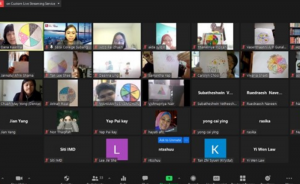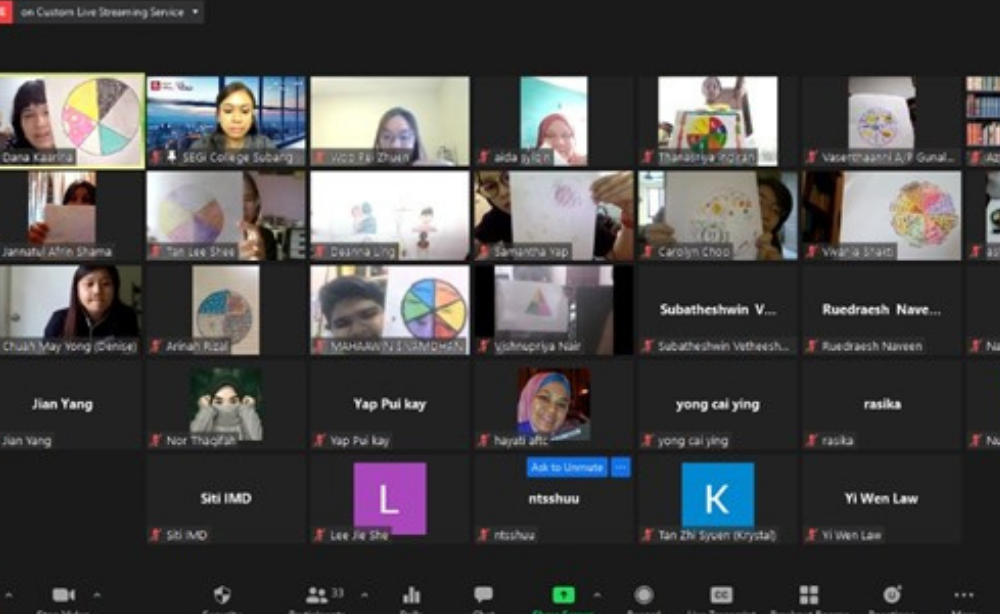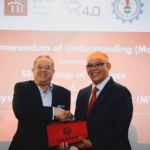SEGi College Subang Jaya’s Expressive Arts exhibition team organised its 7th webinar in its continuous effort to create awareness of the importance of expressing oneself through art and the therapeutic benefits of arts in itself. It was facilitated by a licensed art psychotherapist, Ms Dana Karinaa, who is a freelancer at the Mental Illness Awareness and Support Association (MIASA) and Soul Mechanics Therapy Centre. It was carried out on Zoom and streamed live on YouTube. The two-hour session was moderated by Ms Valarmathy, a lecturer and programme leader from the School of Psychology.
Aristotle once said that the aim of art should be to represent not only the outward appearance of things, but also their inward significance. Art does not have to always be about pretty things. It can also be about who we are, what has happened to us, and how our lives are affected.
Mental disorders constitute a huge social and economic burden for health care systems worldwide. According to the latest National Health and Morbidity Survey, every three in ten adults aged 16 years and above in Malaysia suffer from some form of mental health issues. Studies suggest that art therapy can be truly valuable in treating mental-health issues such as depression, anxiety, post-traumatic stress disorder (PTSD), and even some phobias.
According to the British Association of Art Therapists (2015), art therapy is defined as a form of psychotherapy that uses art media as its primary mode of expression and communication. Clients referred to art therapists are not required to have experience or skills in the arts. The overall goal of its practitioners is to enable clients to change and grow on a personal level using artistic materials in a safe and convenient environment. Similarly, the American Art Therapy Association (2014) reported that art therapy is as a medium to explore one’s feelings, reconcile emotional conflicts, foster self-awareness, manage behaviour and addictions, develop social skills, improve reality orientation, reduce anxiety, and increase self-esteem.
A total of thirty-five participants from different age groups took part in this virtual art-therapy workshop. Prior to the art-making session, the participants learned about art therapy and how it helps to resolve various mental-health problems. Then all the participants were instructed to reflect on what had happened to them or how they had been feeling for the past few days or weeks. After the reflective session, the participants started to make their own artworks based on the thoughts, feelings and emotions which they had identified earlier. The participants were free to use any form of artwork they chose.
Throughout the art-making process, many participants asked Ms Dana questions, expressing their doubts and curiosity about art therapy. Among the questions were, “Do you notice a stigma/reservation when organising art therapy sessions?” “How does art help people to express themselves, especially abused victims?” “How does art therapy help in developing coping skills and resiliency?” “What is the pathway to becoming an art psychotherapist?”
After spending almost an hour working, it was time for the participants to reflect on their artwork. One of the participant’s artwork was an interesting chair he had made out of clay. He reflected, “This chair represents our days spent at home during the movement control order and how our lives were restricted and stagnant, just like this chair”. The children reflected on their artwork too, and some of them wrote down their emotions on a wheel and gave a different colour to each emotion. One of the children, Mahaawin, said “I am excited to participate in this session as I love art and it’s amazing to know that art can help me to express how I feel”.
The session wrapped up with Ms Dana’s feedback on the participants’ reflections. Overall, this session served as an introduction to art and its therapeutic effects. The expressive Arts Exhibition team looks forward to organising more art therapy sessions with Ms Dana to help SEGi students who are in need of mental-health care.







